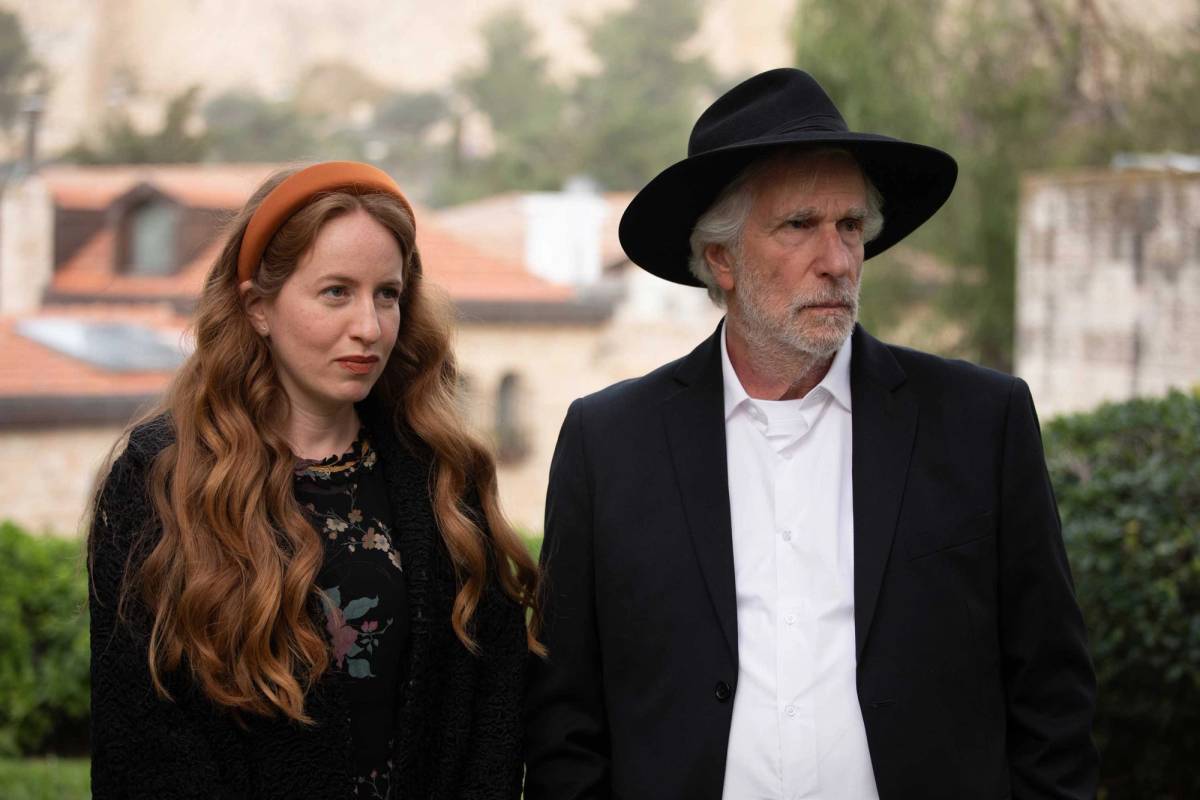The Land of Milk and Horny
In the new television show ‘Chanshi,’ an engaged Jewish woman from Brooklyn flees to Israel to sleep with as many hot IDF soldiers as she can



The premise of one of the most popular Israeli television shows right now is as follows: An engaged Jewish girl from an Orthodox family in Brooklyn flees to Israel to sleep with as many Israeli soldiers as possible. At least, this is how Chanshi, a brand-new comedy drama that recently premiered in Israel, begins. The press kit I received included the first four episodes, which are mostly fun and games, though apparently later episodes will reveal a past trauma, reawakened by her trip to Israel, that threatens to ruin her escapades.
The show was created and written by rising star Aleeza Chanowitz, who also stars in the titular role, directed by Mickey Triest and Aaron Geva, and produced by Ayelet Imberman and Meni Aviram. Some press was garnered about this Israeli American co-production in the States due to the fact that Chanshi’s father is played by Hollywood veteran Henry Winkler, who was seemingly born to play this character (in Israel everyone is super excited to have the Fonz in an Israeli TV series). Her mom is played by another American actress, Caroline Aaron, who plays the Jewish mother in the prime time Emmy Award-winning show The Marvelous Mrs. Maisel.
In Chanshi’s first scene you see Chanshi—a young, pristine looking woman in a virginal white dress—kissing her soldier-boyfriend goodbye on his tank as he is ready to go to war. She is then escorted down from the tank by various other soldiers. She ceremonially proceeds to plant a wet and luscious kiss on the mouth of each and every one of them, in a bizarre Busby Berkeley style choreography. Soon enough we learn that this was actually a wet dream Chanshi had on the plane, hoping to experience a real-life IDF orgy as soon as the plane lands in the land of milk and honey—and gorgeous Israeli soldiers.

In the next scene, Chanshi lands in Israel, heads to Jerusalem, and knocks on the door of her best friend from high school, unannounced and uninvited, under the pretext of coming to surprise her for her wedding, even though they haven’t seen each other in four years and haven’t been in touch. Chanshi isn’t as involved with her friend’s wedding preparations as she professed that she would be, instead spending her first days in Israel shamelessly hitting on every cute and dark Israeli, preferably in a uniform, she sees.
Eventually, she consummates her first back-alley quickie with a random soldier she meets at a shawarma stand. She is so delighted by the rendezvous that she decides to stay and make aliyah, to the horror of her parents and her abandoned fiancé. She promptly goes to the Ministry of Interior, taking it as a major compliment when some woman calls her “the ugly Israeli” for cutting in line. In her mind, a bit of chutzpah, and enough sexy IDF notches in her belt, are all it takes to become Israeli—and this is a girl who’s willing to do whatever it takes.
“This is a girl from Brooklyn who comes here to check out the guys and the soldiers and the sex in Israel and to try everything, to take herself to the most dangerous situations through sex as a means of finding herself and understanding why she is staying here,” said Mirit Toovi, the head of drama at Israeli Cable company HOT, in an interview to Haaretz. “This is a story about immigration, but through sex. And for someone who grew up in a place where sex is forbidden—this is very original and real.”
Chanshi loves to provoke. She loves the fact that she’s the bold and fearless one in her religious peer group and never seems to feel any guilt about it. That’s what makes her so different from her friends, who are seemingly all plagued with guilt. Watching the show, it’s shocking how blissfully unaware Chanshi is toward every social norm—not just in Israel, but nearly everywhere on the planet. Sometimes, it’s deeply uncomfortable, but sometimes, her lack of regard for social norms becomes her superpower.
After a wild start, things calm down a bit when Chanshi meets David (Tomer Macloof from Fauda and Tehran), a dark and handsome Mizrahi religious guy. She woos him in her signature straightforward style. He’s intrigued and attracted to the strange American girl while baffled by her unorthodox take on what it means to be observant. Things hit a turning point when she decides to join him on a trip to see a friend of his in an illegal settlement. One of the best scenes in the first episodes of Chanshi takes place on a shooting range in the settlement.
Coming from an entirely different world, the ideological and political meaning of the settlement never enters Chanshi’s consciousness. David explains to her that the place is dangerous, but danger, as has been established, only turns Chanshi on. She likes to play with fire, both metaphorically and literally. As she does with most guys she meets, she immediately requests to see David’s friend’s gun—and then asks to try it out. The wonderful scene in which Chanshi clutches the gun, high on adrenaline, gleefully screaming and laughing her head off while shooting, reminded me of a young Sissy Spacek at the shooting range in Robert Altman’s 1977 film, 3 Women.
Both Chanshi and Pinky—Spacek’s character in 3 Women—present with an air of bygone innocence, reminiscent of the 1970s original Holly Hobbie illustrations or Little House on the Prairie—with their long and childlike red manes and their ruffled floral dresses. Although the atmosphere and background are very different, in both scenes the little redhead enters the shooting range on a search for her own identity and sexuality, takes an extremely macho man’s gun in her hands, and shoots in order to impress him and to assert herself. Sex, violence, and power are intertwined in these scenes—the women are shooting the gun to impress the men, which it certainly does, but also to free themselves.
When the men seem surprised at Chanshi’s penchant for shooting, she smiles and naughtily says “well, I’m American.” This, I believe, is the key to Chanshi’s twisted and endearing psyche. Sure, her obsession with Israeli soldiers is stemmed in Zionism, but it feeds off American fantasies that have nothing to do with her Jewish upbringing. She comes to Israel—a country full of soldiers with guns—from the United States, the most trigger-happy nation on earth. The fact that she is attracted specifically to Mizrahi soldiers also reflects a very American sexual fantasy—the fetishization of the exotic and the “other.”
Generally speaking, any girl of Chanshi’s age needs to make sense of mixed messages, even without coming from an Orthodox background. But in Chanshi’s case, she grew up within so many different cultural frameworks that her head is often spinning. Between Zionism, religious modesty, family values, the pornification of American pop culture, and the natural exhilaration of youth, her head is full of a competing mishmash of motivations—and stereotypical clichés. These stereotypes influence her sense of identity, sexual desires, and romantic fantasies, often leading to uncomfortable moments where she inadvertently seems racist or transgresses upon social norms with a blunt lack of political correctness—which she either rationalizes quickly-but-clumsily, or gets away with by flashing a trademark sheepish grin.
What sets Chanshi apart from most other young women with her background is that she doesn’t suppress her urges, while she often feels that others around her do. The moment she realizes she doesn’t want to marry her fiancé, she starts suspecting that all her Orthodox friends are getting married to the wrong people and for all of the wrong reasons. When she feels something or wants something, she immediately goes after it—at least when she’s far from her parents in Israel, anyway.
The show’s creator, 32-year-old Aleeza Chanowitz, bears several biographical similarities to Chanshi. She too grew up in a religious family in Brooklyn and made aliyah 11 years ago. In Israel, she graduated from the Sam Spiegel Film and Television School in Jerusalem. Her two short student films, Mushkie (2016) and Shabbos Kallah (2018), were met with much enthusiasm, with the first getting accepted to the Berlin Film Festival and the second winning the short film award at the Jerusalem Film Festival. Their themes are reminiscent of her eventual work in Chanshi, gleefully and unsentimentally smashing the image of the pure and holy American Jewish girl making aliyah to fill the earth in the holy land. She also plays the title character in these films, and each role fits her like a glove—to the point where you have to wonder how many of these details are autobiographical.
As Chanowitz has conveyed in interviews, many of them sort of are, though nowadays she’s married to an Israeli and living in Tel Aviv. While doing local press interviews for Chanshi in December, she was pregnant with her first child. When asked about her religious identity, she explained she didn’t "yotzeh beshe’ela" exactly—she just chooses what’s right for her and makes it up as she goes along. Much like Chanshi.
One has to imagine that, beyond the creator’s own life, the show draws inspiration from HBO’s Girls, another series created by a young New York woman who cast herself in the starring roles. Neither Lena Dunham nor Chanowitz did this out of vanity, but rather because they feel that nobody can tell their story as well as they can. Both shows give the world a glimpse into the here-and-now of certain types of, um, girls—how they think, how they act, how they feel, and certainly how they feel about sex. A lot of the humor in Chanowitz’s films, and in Chanshi, feels very Judd Apatow, getting laughs from cringeworthy moments in a way that ultimately makes the viewer sympathize with the character even more. With the Orthodox-Jewish world and its norms a backdrop, this comedic style works especially well.
Judging from the first four episodes of Chanshi, the more we get to know the lead, the more we root for her, and the more we see her journey as an empowering one. Sure, she commits a lot of social crimes and regularly throws logic and caution to the wind, but she is fighting for her freedom to make her own decisions, create her own identity, express herself freely, and fulfill her sexual desires. Taking into consideration the place she came from, that can’t be easy.
“Chanshi” premiered this month on Israel’s HOT and NEXT TV and will be shown in the U.S. in the Indie Episodic program of the 2023 Sundance Film Festival.
Dana Kessler has written for Maariv, Haaretz, Yediot Aharonot, and other Israeli publications. She is based in Tel Aviv.